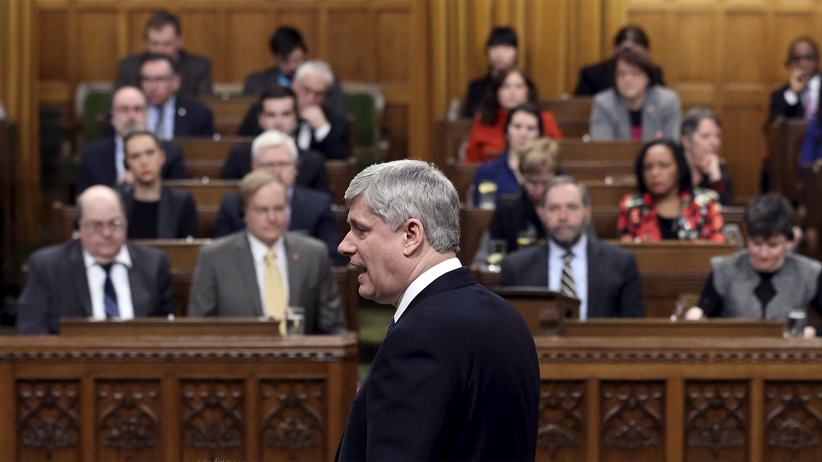Strong Leader: Harper’s thrice-bare cupboard
When this guy spends the surplus, he doesn’t mess around, writes Paul Wells
Share

The legion of pundits who predicted a spring election were wrong. We’ll vote in October as planned. But if it’s any consolation, the Conservatives tabled their election platform in the House of Commons on Tuesday.
It’s a long time since this government called its budgets, well, “budgets.” In 2011, the thing’s title was A Low-Tax Plan for Jobs and Growth. In 2012 and 2013, it was Jobs, Growth and Long-Term Prosperity. Last year, it was Creating Jobs and Opportunity.
This year, things are a little different. Sure, the subtitle is almost identical to 2011’s title, with two telling differences: A Balanced-Budget, Low-Tax Plan for Jobs, Growth and Security. But the bold print tells us what Prime Minister Stephen Harper wants the election to be about: Strong Leadership.
What does Strong Leadership look like? It doesn’t look like messing around, sailor. Times are tough. The cupboard is bare. Be grateful for what you’ve got. Sure, there are surpluses, but they are weensy things: $1.4 billion this year (a figure achieved by selling GM stock and trimming the government’s rainy-day contingency reserve), $1.7 billion next, $2.6 billion in each of the two following years. It’s not until 2019, the last year of the next government’s mandate, if it’s a majority government, that Ottawa gets any room to manoeuvre at all.
Which is precisely the point. Harper, Jim Flaherty and Joe Oliver built this flinty little fiscal cabin for us to live in, and Harper likes it fine. But if the Liberals or New Democrats have any dreams for a government that does more, they’re going to have to find ways to pay for it. Ways that involve raising taxes. And that’s not Strong Leadership, is it? It’s soft. It’s weak. It’s entitled. There’s no room for that sort of snivelling in Stephen Harper’s Canada. This is Sparta.
[widgets_on_pages id=”FederalBudget”]
In order to go before the Canadian people and credibly claim the cupboard is bare, Harper has had to work hard on three separate occasions to bare the cupboard. First was in 2006-08, when he cut two points off the GST and reduced the Chrétien-Martin surpluses nearly to zero. The deficits after the 2008 economic downturn were all the more severe, because Harper had left so little room to manoeuvre. But surpluses came back into view last autumn, and Harper set about cutting them pre-emptively nearly to zero. He did that on one day last October by announcing the so-called Family Tax Package.
A chart in the budget documents introduces us to Henry and Cathy, a couple earning $120,000 with two children. They’ll receive $6,640 in 2015 from all the tax relief and enhanced benefits announced by the Harper government since 2006. Some 47 per cent of all that money was announced last October. And, unlike almost all new spending announced in the budget, which will be spread out over future years, the new tax relief is immediate. As a measure of the Conservatives’ preference for tax cuts and gadgety tax benefits over direct program spending, consider the total value of each in 2016-17. Tax cuts account for a $7.1-billion change to the budget balance in that year. Direct federal spending will account for $1.4 billion. If a reporter tells you about “big new Conservative campaign spending promises,” assume he is still so stuck in the patterns of discourse he learned under previous governments that he hasn’t learned how to talk about this one.
The third cupboard-baring exercise, made immeasurably easier by the first two, is this budget. It lays out comparatively modest spending plans, but takes care to announce spending, not just for this election year, but for the next three years. There’s new money for the Canada Foundation for Innovation—$1.33 billion over six years, starting in 2017-18. There’s up to a billion per year on public transit—starting in the same year. And there’s about a billion in new defence spending per year, also starting in 2017-18. Nothing’s too good for our men and women in uniform, and if it means binding an NDP government to a three per cent annual increase in defence spending, starting halfway through its mandate, well, that’s Strong Leadership.
Stephen Harper wants a federal government that does less, especially in social programs, than it did when he arrived in Ottawa. He will not compete with other parties for grandeur of vision. He will call their grandeur reckless. His discipline is formidable. Last week, the parliamentary budget officer said this budget will mark five years of continued reductions in federal direct program spending as a fraction of GDP. That decline in Ottawa’s share of the economy is unprecedented, the PBO said. Tuesday’s budget projects that the trend will nearly double in length, through 2019-20. If you don’t like it, if you think this trend line marks the frittering away of Canada’s collective ambition, then you know, more clearly than ever, whom not to vote for. Stephen Harper has laid his bet for the toughest election of his life.